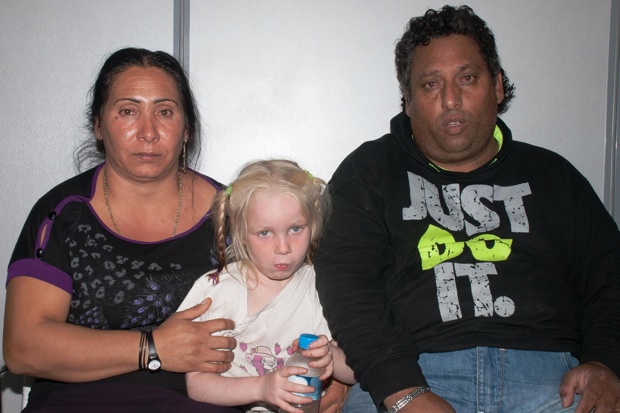How should we describe the people who allegedly abducted that little girl in Greece, after a neighbour claimed that they actually paid £850 for her to a passing Bulgarian? It is a minefield we are entering now, having asked this question. Clearly the terms which hitherto some of us may have employed, not always affectionately — pikey, gyppo, tinker — are likely to get you into trouble with the police these days. Probably more trouble than if you, for example, dug up the road to remove a few hundred yards of fibre optic cable, or declined year upon year to pay your taxes. So those three are out.
Gypsy, we are told, is also a pejorative term, although the Travellers’ Times — an online site which you probably help to pay for somewhere down the line — uses the word happily enough. However, the delicious chocolate- and coconut-flavoured biscuits Gypsy Creams have long since disappeared from the shelves of our supermarkets, lest they in some way give offence. Then, of course, there is ‘traveller’, which seems to be the politically correct gentilic here — certainly this is what Vanessa Redgrave uses on the occasions when this immensely caring and committed actress spends a few hours away from Hampstead campaigning upon their behalf, to the irritation of swaths of rural ratepayers.
The problem then, though, is what to call them when they no longer wish to travel anywhere: you would surely not care to lump together a group of people under what amounts to a living denial. Our hospitals and education services have got around this with the thrillingly oxymoronic description ‘static travellers’, which at best suggests that these people — like Carlos Castaneda after swigging a few cups of peyote tea — travel only in their minds. Both Roma and Romani are imprecise and in any case gender-specific, even if it is politically preferred at the moment (these derogations change by the week, by the hour). We are left with Lom and Dom, which locates the people in Trans-caucasia, and therefore excludes the Irish travellers, static or otherwise, who keep us in the UK glued to our television screens with their flamboyant parties, bare-knuckle fights, remarkably high levels of illiteracy and occasional forays into what some might call the rather de trop economic enterprise of slave ownership.
So Lom and Dom are not much good to us, and still less the preferred Romanian term, Tsingani, which the Loms and Doms reportedly heartily dislike. It still seems to me that ‘gyppo’ and ‘pikey’ are useful means of lumping them all together — but then one supposes that they would prefer not to be all lumped together, except when it is to make the case that they are similarly oppressed and persecuted by people like me.
I have spent some time on the question of nomenclature because, firstly, it seems to be open season on these people, whatever it is you want to call them. And secondly because from January, thousands upon thousands more of them will be arriving in the UK from Bulgaria and Romania, much to the absolute delight of the governments of Bulgaria and Romania. European Union work restrictions on these people expire on New Year’s Day and, despite unbiased and non-partisan BBC news reports that very few will actually come over here and those who do will be absolutely bloody lovely people, our own government is bracing itself for somewhere in the region of 50,000, not all of whom will be fully qualified neurosurgeons or Stakhanovite plasterers. The advance party of these hordes is still camped out somewhere near Park Lane in a sort of shanty-hamlet. Just wait, just wait. The French authorities recently evicted thousands from a campsite near Marseilles and the scene left behind brought to mind the sort of thing you might see in Rwanda or, at best, Manila. Whatever — it seems only right to me that as we prepare to welcome these valuable incomers (as the Romanian ambassador puts it, guffawing behind his hand) we should settle upon a name for them all, or we will be left only with confusion.
So, little Maria, aged four or five, nobody is very sure, but a ‘blonde’ and ‘blue-eyed’ (i.e. not Roma, or Romani, or static traveller) ‘angel’ was allegedly abducted by Hristov Salis and his fragrant partner Eleftheria Dimopoulou and used for begging. She was held by them at some ghastly campsite in northern Greece. During the raid on the site the Greek police discovered the usual haul of a gun, bullets, knives, stolen credit cards, cameras, laptop computers and of course drugs. The story is front-page news from Thessalonika to Dublin, partly, I suppose, because it is what people commonly think the travellers get up to; it invokes that Europe-wide nursery tale of the gypsies in the wood who will spirit you away. Well, occasionally it seems they will. The story has particular resonance in the UK because of the similarities between Maria and another abducted girl, Madeleine McCann — plus, of course, the arrests of several travellers on charges of slavery is still in our minds.
Not all travellers abduct little girls or enslave people, of course; but there is a profound antipathy towards them for other aspects of their behaviour all the way across Europe, especially in the centre of the continent and in the east. That is one reason why they will be flocking to the UK as soon as they are allowed — so we’d better sort out what it is we should call them.
An earlier version of this article said that the couple accused of abducting Maria had claimed they paid £850 for her. This claim was in fact made by a neighbour rather than the couple.







Comments